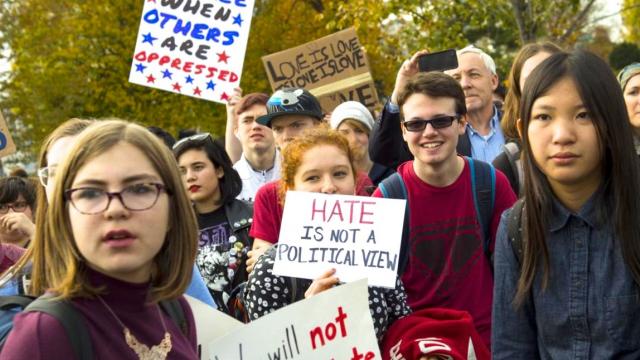
The protests against Donald Trump on his Inauguration Day could stand out as one of the largest counter-inaugural protests in United States history. As of last week, over a dozen groups were securing permits, chartering buses and training actions for mass protests throughout the week.
But even if some can't make it to Washington, D.C., there could be protests closer to home.
College students across the country in cities like Los Angeles and Chicago are planning walkouts and marches, taking the Inauguration Day protests to the campuses where they live and work. Leftist groups like Students for a Democratic Society and the student arm of Socialist Alternative are coordinating across chapters of the University of Houston, University of Minnesota, University of Cincinnati, University of California — Berkeley and Los Angeles — various schools in Seattle and Philadelphia, and more schools as Inauguration Day approaches. And the organizers insist these protests are only the beginning of a broader resistance movement.
"What's most crucial is that we make the strongest possible statement that we're not willing to give Trump a chance, or any head start in putting together attacks on working class people, people of color or immigrants," Keely Mullen, a national organizer with Socialist Alternative, told Mic.
Students have already begun their protests: In the days after Trump's election, Socialist Alternative helped kick off massive marches in New York City, Seattle, Philadelphia, Oakland, California, and Ann Arbor, Michigan.
"The opposition to Trump was swift and immediate," Brian Harrison, the branch organizer for Socialist Alternative in Houston, told Mic. "On Nov. 9, we called a demonstration and we had 100 people show up — tenfold in places like New York and Seattle. There's been a tremendous amount of interest."
Now, nearly a dozen socialist student events exist on Facebook for Inauguration Day marches and walkouts, with declarations such as "No deportations of undocumented immigrants!" and "Black Lives Matter! End police brutality and mass incarceration!"
Many of these local protests are being organized by activists from groups that haven't yet collaborated on major actions. In Chicago, protesters will join Black Lives Matter activists and the International Socialist Organization. In Boston, college marchers plan on uniting with high school students who've already staged anti-Trump walkouts.
Another group handling protests in at least 12 cities is Students for a Democratic Society. Originally founded in the 1960's, SDS was rebooted in 2006 largely in response to the Iraq War. But once President Barack Obama was elected, much of that revolutionary energy dissipated.
"After the war ended, a lot of people felt like they didn't have to keep going," Ian Decker, national organizer for SDS, told Mic. "We're trying to manage this in a way that we don't make the mistakes that were made back then."
There's a lot of new interest to manage. SDS typically receives a couple of inquiries a week about how students can form a chapter at their school. Within hours of Trump's victory, the national working committee had dozens of inquiries, and now field about ten a week.
The protests on Inauguration Day aren't meant to be the end result, but the birth of a new student movement. The American Left has a bad reputation for internal divisions, bickering and sectarianism, making it hard to get anything done. Unity and coalition-building is a theme across not just the student protests, but the groups which will be present in D.C. at Trump's inauguration, protesting in the tens of thousands.
"The idea is that this creates the basis for something we can return to as needed, as attacks start to come down, not just on the defense, but the offensive," Mullen said. "We still need $15 an hour, we still need affordable housing — these organizations aren't just struggling against Trump, but also for concrete demands."
In other words, the goal of the organizers isn't just to demonstrate displeasure. It's to prepare for the possible calamities Trump's administration could inflict.
"We want to prepare the ground for the strongest possible resistance for day one," Mullen said. "This is a powerful way to build something that can actually challenge him for however many years he's in office. This isn't a one and done deal."
3 WAYS TO SHOW YOUR SUPPORT
- Log in to post comments












Comments
Thomas replied on
Nice work
Great to hear that so many people are engaging. Be peaceful and respectful, as Michelle said: "When they go low, We go high"
DH Fabian replied on
Recognizing Reality
Yes, protest is expected. Protest is an expression of opinion -- not political resistance. Protest is good, healthy for society, but only when it doesn't more deeply divide ordinary people by class and race.
Many knew that the years of the Obama administration represented our last chance to pull people together, for the common good -- poor and middle class, workers and the jobless, all races. It was worth a try, but didn't work. Our bourgeoisie have never seemed more disconnected from reality, workers continued to look down their noses at those who have been left jobless, and we're only more split apart by race and ideology. And that wasn't Obama's doing.
We've reached the point where real mass resistance is necessary to push back against (what does meet the definition of) fascism. Yet, we have to recognize that we've only been more deeply divided. Pretending this isn't true only prevents whatever remote chance there is of bringing the "masses" together, for the common good.